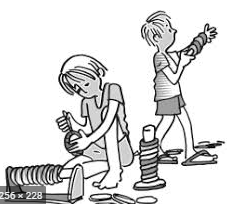
This article contains the essentials of Lost Spring Summary Class 12 English, where we are going to give you a summary of Lost Spring Summary Class 12 English with a gist of summary and conclusion. In this chapter we will study about neighbourhood of the narrator Anees Jung, who gives us an account of different poor children’s views on their life. Your all doubts from the chapter of The Lost Spring Summary Class 12 English of class 12 Flamingo will be cleared from this summary. Lost Spring is from English Chapter 2 Class 12, and it follows the telltale of children living in poverty.
( Lost spring Story of Stolen Childhood )
Read more: The tiger king summary class 12 English
Biography of Anees Jung Lost Spring Author
Anees Jung, The Lost Spring writer, was conceived in Rourkela in Odisha in 1964. She is an Indian journalist, author and columnist. Nawab Hosh Yor Jung was her father. Her brother and mother are both Urdu poets. After completing her education at Osmania University, Hyderabad, she moved to the United States to pursue higher education at the University of Michigan Ann Arbor. There she received her master’s in sociology.
Lost Spring Summary Class 12 English : Introduction
The narrator encounters several children from a poor neighborhood and tells us about her experience after meeting these children. She shows us how poverty can affect people and their work. In her account, she focuses on how the middle man, other bureaucrats, etc. treat these poor people and why some of them left their homes to join India. Lost Spring Summary Class 12 English is a tragic excerpt from her book titled ‘Lost
Spring, Stories of Stolen Childhood’. Let us learn how and what she has analyzed in this excerpt.
Lost Spring Summary Class 12 English: Saheb-e-Alam( saheb e alam )
This segment talks about the summary of Lost Spring Class 12. Saheb-e-Alam(saheb e alam) is a boy whom she encounters every morning in search of money in the garbage bins. Saheb came from Dhaka to India. He had to leave his hometown because storms destroyed all their fields and home. They had to thus leave it and come to India in search of ‘golds’ that is jobs or money to feed themselves. He didn’t go to school and had nothing else to do rather than searching money in the garbage or he roamed the streets with his friends. They were so poor they could not even afford shoes or chappals.

Man from Udipi
He used to go to school past a temple. His father was a priest there. He always prayed for a pair of shoes when he passed by the temple. He finally got the shoes and then prayed to the Goddess in the temple to never lose them. But thirty years later the new priest’s child was seen wearing a pair of shoes. The people like priests became wealthy but the ragpickers of the narrator’s neighbourhood still remained shoeless.
Seemapuri
People in Seemapuri were mostly Bangladeshis who came to India in 1971. Saheb and his family were one of them. Along with many others, Saheb lived in structures of mud, with roofs of tin and tarpaulin, devoid of sewage, drainage or running water. In Seemapuri ragpickers were prominent. They lived there for more than thirty years without an identity, without permits. They only had ration cards that get their names on voters’ lists and enable them to buy grain. Because food is more important for survival than an identity.
For children garbage is a bag of wonder because they find many things which brighten their day. For adults garbage is a bag of survival because they can find food to feed their stomach. That is all that matters in rag picking. Saheb finally gets a pair of shoes that are tennis shoes. A rich boy gave it to him because it had a hole. Since he always walked barefoot having a hole in the shoes did not bother him.
Saheb grew and finally started working at the milk booth. He was paid 800 rupees and all his meals. He did not like the job but it paid and fed him which was enough for him. But this job came with a price. He lost his carefree look and started to worry about time and his job. The steel canister was also heavier than the plastic bag he used to take to roam around. The bag belonged to Saheb but the canister was of the man who owned the tea shop. Saheb was no longer his own master. He worked under someone else.

Lost Spring Summary Class 12 English: Mukesh
Mukesh wanted to be a motor mechanic. He does not really know about cars but he used to say that he would learn to drive a car. He lived in Firozabad. Mukesh’s family worked in one of the bangle making factories in Firozabad. He helped them too even though it is illegal for children to work of his age.
Mukesh lived down the stinking lanes choked with garbage, in a home that remains hovels with crumbling walls, wobbly doors, no windows. He lived in a half built shack. His elder brother’s wife used to make food for the three of the men, her husband, Mukesh and their father. Mukesh’s father failed to renovate a house and send his two sons to school. All he has managed to do is teach them what he knows — the art of making bangles, and thus were one of the oldest bangle makers of Firozabad. Mukesh’s grandmother believed that it was a God given lineage to make bangles and it could not be broken down. They often went blind by making bangles.
Mukesh always dreamt of being a motor mechanic and wanted to go to the garage even though it was far away by walking. He was content to dream of cars that he saw hurtling down the streets of his town.
Lost Spring Summary Class 12 English: Savita
Savita was a young girl who used to help her grandmother make bangles. She made red bangles which specially worn by brides during marriages. Savita’s grandmother said that she has not enjoyed even one full meal in her entire lifetime. Her husband knew nothing except bangles. All he had done was made a house for the family to live in.
Years of mind-numbing toil have killed all initiative and the ability to dream. They only knew to make bangles and passed down this tradition to the future generations and thought that these God given lineages could not be broken down. So no one actually dreamt of or challenged anything. The sahukars, the middlemen, the policemen, the keepers of law, the bureaucrats and the politicians have trapped them in a circle of debt from generations after generations. There is also the caste system which do not really let them dream of anything else. Thus they had to work on an bangle makers and accept their fates.

Summary of The Lost Spring Class 12 in Hindi(The Lost Spring Summary in Hindi/Lost Spring Explanation in Hindi)
पहला भाग गरीब कूड़ा बीनने वालों के जीवन के बारे में लेखक के छापों को बताता है। कचरा बीनने वाले ढाका से आए हैं। इसके अलावा, कचरा बीनने वालों की बस्ती सीमापुरी क्षेत्र में है। तूफान से उनके खेतों और घरों में तबाही मच गई है। वे वहाँ रहने की आशा में बड़े शहर में आए थे। हालांकि, हकीकत उनके लिए दर्दनाक थी और उन्हें कई मुश्किलों का सामना करना पड़ा। वे निश्चित रूप से गरीब हैं और उनके पास विभिन्न संसाधनों की कमी है। लेखक हर सुबह साहब को देखता है जब वह पड़ोस में "सोने" की तलाश करता है। इन कूड़ा बीनने वालों के जीने का जरिया कचरा ही है। इसके अलावा, बच्चों के लिए, यह एक चमत्कारिक बात है। बच्चों को इसमें से एक या दो सिक्के मिल जाते हैं। इन लोगों की महत्वाकांक्षाएं और इच्छाएं होती हैं। समस्या यह है कि उन्हें इसे संभव बनाने का तरीका नहीं पता है। बहुत सी ऐसी चीजें हैं जिन तक वे नहीं पहुंच पाते हैं। बाद में साहेब एक चाय की दुकान में शामिल हो जाते हैं जहाँ उनके लिए 800 रुपये और सभी भोजन कमाने की संभावना है। हालाँकि, इस नौकरी ने उन्हें उनकी स्वतंत्रता से वंचित कर दिया। ऐसे में उनकी हालत काफी निराशाजनक और दुखों से भरी है। दूसरा भाग मुकेश के जीवन की पड़ताल करता है। मुकेश एक लड़का है जो चूड़ी बनाने वालों के परिवार से ताल्लुक रखता है। फिरोजाबाद अपने अद्भुत कांच उड़ाने वाले उद्योग के लिए प्रसिद्ध है। इस विशेष व्यवसाय में लगभग 20,000 बच्चों की सगाई है। इसके अलावा, वहां कोई भी उस कानून को नहीं समझता या सम्मान नहीं करता है जो बाल श्रम को मना करता है। इसके अलावा, रहने की स्थिति, साथ ही साथ काम करने का माहौल, दोनों ही भयानक हैं। ये बच्चे सुनसान कोशिकाओं में रहते हैं। इसके अलावा, वे गर्म भट्टियों के करीब काम करते हैं। यह निश्चित रूप से बहुत खतरनाक है क्योंकि यह इन बच्चों को वयस्कता में प्रवेश करने पर अंधा बना देता है। इसके अलावा, इन बच्चों को कर्ज के दबाव से भी जूझना पड़ता है। इसके अलावा, वे इस समस्या के समाधान के लिए कोई समाधान नहीं सोच पा रहे हैं। इन बच्चों के लिए इस जाल से निकलने का कोई रास्ता नहीं है। पुलिसकर्मी, नौकरशाह, बिचौलिए और राजनेता सभी उनकी प्रगति के मार्ग में बाधक होंगे। घर की महिलाएं इसे अपना भाग्य या भाग्य मानती हैं। इस तरह की सोच के परिणामस्वरूप, वे बस स्थापित परंपरा का पालन करते हैं। मुकेश की बात ही कुछ और है। वह वहां के बाकी लोगों की तरह नहीं है। ऐसा इसलिए क्योंकि मुकेश के बड़े सपने हैं। उसकी इच्छा भविष्य में मोटर मैकेनिक बनने की है। वह जहां रहता है वहां से गैरेज बहुत दूर है लेकिन उसके पास चलने का दृढ़ संकल्प है।
Lost Spring Summary Class 12 English : Conclusion
Lost Spring Summary Class 12 English is a chapter that tells us about the lives of children and their families and how they are affected and exploited everyday. The caste system plays an important role in all of this too. Since they do not even receive education they feel that they can not get out of their miserable lives and thus they give up to their fates and live a life doing what their parents do. They can not even complain because they are affected and trapped by the middleman and police who beat them up if they go against them. Life for them is just miserable and very little is being developed.
Lost Spring Class 12 Question Answers ( Lost Spring Stories Of Stolen Childhood )
1. Why have Saheb and his family migrated to Seemapuri? What is Saheb looking for in the garbage dumps?[ Alternatively : What does Saheb look for in the garbage dumps?]
Saheb is looking for money in the garbage dumps, since after they left from Dhaka, Bangladesh, they turned to ragpicking as a source to satisfy their needs in India.
2. Character sketch of Mukesh/Who is Mukesh in Lost Spring? Where does Mukesh live?
Mukesh lived in Firozabad.
Savita was a young bangle maker. She along with her grandmother made various bangles.
3. Who is Saheb? Where has Saheb come from? Who is Savita?
4. What does the title Lost Spring convey? [Alternatively : What is Lost Spring about?]
5. Explain Lost Spring word meaning [Alternatively : Justify the title Lost Spring]
6. Where is Seemapuri in Lost Spring situated?
The city of Firozabad is famous for what [Alternatively: What makes the city of Firozabad famous?]
Firozabad, popularly known as the glass city of India and the city of bangles, is situated around 47 km away from Agra. It was built by Feroz Shah Tughlaq, the Tughlaq ruler, and is well known for its glass bangles and other glass items.
7. Mention some Lost Spring characters
8. Which character does the following excerpts refer to
1. Garbage to them is gold
2. Firozabad is famous for bangles
3. The ragpickers remain shoeless
Choose the correct option
Mukesh wants to learn to become a motor mechanic by
A. visiting a garage to learn
B. going to the field to play
2. Mukesh
3. Saheb
A. visiting a garage to learn
9. “I know nothing except bangles.” Who said these words? Do you agree with the statement that food is more important for survival than an identity?
For the millions living below poverty line, their needs and wants differ a lot from the priviledged section of the society. For them, to be able to provide three meals a day for their family becomes their sole motive. In this race, their identity gets lost. Thus for them, food is more important for survival than an identity.
10. Who is Mukesh? What is his dream? [Alternatively : What does Mukesh want to become?] How can Mukesh realise his dream?
Mukesh has a desire of becoming a motor mechanic when he grows up, despite coming from a low-income family that makes bracelets. If he works hard and is determined, he can achieve his goal.
Although there may be many challenges on his path, a strong willpower will enable him to proceed in the direction of achievement. He clearly has a strong commitment to learning the trade because he is willing to walk a considerable distance for it.
11. How is Mukesh different from Saheb? Describe the life of ragpickers in Seemapuri
Mukesh had a different outlook on life than Saheb had. He was more upbeat about his future than Saheb, and as a result, he dared to dream. In addition to wanting to become a mechanic, he also wanted to become a driver. Saheb had no dreams or aspirations for the future since he lacked motivation.
More than 10,000 rag-pickers reside in Seemapuri and have mud structures with tin and tarpaulin roofs. They lack running water, drainage, or sewage systems. They have no identity other than a ration card that they use to vote and purchase grain. They continue to walk barefoot, and to them, trash is riches.
12. What is Firozabad famous for and why? What are the two different worlds in Firozabad? What does a bangle signify?
In Firozabad, the author discerns two distinct worlds: one is that of the family entangled in the web of casteism and poverty, and the other is the tangled web of “sahukars,” or intermediaries, police officers, bureaucrats, and politicians.
After marriage, for Indian women, bangles are not just mere accessories, but they signify signs of good health, fortune, and wealth, and hence remain a customary tradition, forming an important component of their identity.
13. Explain these meanings in Hindi
• hutments meaning in hindi : झोपड़ियाँ
• hovels meaning in hindi : फावड़ा
• swept away meaning in hindi : मिटा दिया
• hauled up meaning in hindi : ज़ोर लगाकर खींचना
• priests meaning in hindi : पुजारियों
• glibly meaning in hindi : चिकनाई से
• scrounging meaning in hindi : छानना
• ragpickers meaning in hindi : कूड़ा बीनने वाले
• she dumped him meaning in hindi : उसने उसे छोड़ दिया
• steel canister meaning in hindi : स्टील कनस्तर
• stolen in hindi : चुराया हुआ
• the lament story in hindi : विलाप की कहानी
• bangles meaning in hindi : चूड़ियाँ
• envisioned meaning in hindi : अनुरूप
• meaning of name Mukesh in hindi : गूंगा के भगवान, भगवान शिव का एक अन्य नाम को आजाद कराने के होता है
• I dump him meaning in hindi : मैं उसे डंप करता हूँ
• lost spring meaning in hindi : खोया हुआ वसंत
14. Explain these meanings in English
• mind numbing toil meaning : losing clarity because of a hefty work
• transit homes meaning : dwellings which provide basic necessities along with various amenities
• sometime meaning in english : a certain time slot provided
• wobbly doors meaning : incomplete or half built doors
• god given lineage meaning : determining ancestry on the basis of profession
• lost spring meaning : spring that is lost